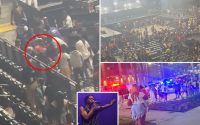How DOJ, Hunter lawyers tried to sweet-talk judge into accepting sweeping plea deal
Hunter Biden’s defense team and federal prosecutors tried to slip the first son’s wrist-slap plea deal past a Delaware federal judge Wednesday, only to see their plan unravel when the jurist called out the agreement as flawed — and possibly unconstitutional.
Hunter, 53, was poised to admit to two misdemeanor counts of willful failure to pay federal income taxes and enter a diversionary program on a felony weapons charge.
However, near the end of the diversionary agreement was a paragraph reading, in part, “The United States agrees not to criminally prosecute Biden, outside of the terms of this Agreement, for any federal crimes” committed by the first son for which the statute of limitations had not already expired.
One problem: Diversions are granted at prosecutors’ sole discretion. They’re a pledge not to prosecute a specific crime — in this case, Hunter Biden’s gun charge — if the defendant meets certain conditions.

While judges have authority to accept or reject plea deals, they often do not have a say in diversion agreements. US District Judge Maryellen Noreika smelled a rat, complaining that she was not given a copy of the crucial paragraph until just before the hearing began.
“Are you relying on that promise in connection with your agreement to accept the Memorandum of Plea Agreement and plead guilty?” Noreika asked Hunter, who responded: “Yes, your honor.”
“If that provision were not valid or not enforceable, would you accept [the agreement]?” the judge followed up, to which Hunter answered: “No, your honor.”
Moments later, Noreika noted the diversionary agreement did not include a space for her signature, while the plea deal for the tax misdemeanors did.
“You’re saying I don’t even get to accept [the diversion agreement], I guess I’m supposed to rubber stamp it,” Noreika said. “I am concerned that you’re taking provisions out of the agreement, of a plea agreement that would normally be in there.”
“She was basically caught on the fly here having to say ‘Well, let’s talk about what this is all about.’ And it became clear that it was not properly thought out,” Paul Kamenar, counsel to the National Legal and Policy Center, told The Post.
Noreika made prosecutor Leo Wise the focus of her ire, asking at one point: “Do you have any precedent for agreeing not to prosecute crimes that have nothing to do with the case or the charges being diverted?”
“I’m not aware of any, your honor,” Wise conceded.

Moments later, Noreika blew a massive hole in the deal.
“To the extent that the agreement not to prosecute is promised, do the parties have some understanding what the scope of that agreement is?” she asked Wise.
“Yes, your honor,” he said.
“No, tell me, like specifically what does it include,” Noreika pressed. “You said that there is an investigation, I don’t know what that is, but you must know that if there are particular charges that could be brought based on the facts that are there.”
“I can tell you what I think we can’t charge. I can’t tell you what the ongoing investigation is,” Wise deflected. “So, for instance, I think based on the terms of the agreement, we cannot bring tax evasion charges for the years described in the factual statement to the plea agreement. And I think we cannot bring for the firearms charges based on the firearm identified in the factual statement to the Diversion Agreement.”
“Could the government bring a charge under the Foreign Agents Registration Act?” asked the judge, alluding to what appears to be a federal probe pertaining to the younger Biden’s overseas dealings.

“Yes,” Wise admitted.
Defense lawyer Chris Clark then made a stunning remark: “As stated by the government just now, I don’t agree with what the government said.”
“I mean, these are contracts,” Noreika said. “To be enforceable, there has to be a meeting of the minds. So what do we do now?”
“Then there is no deal,” Wise said.
“As far as I’m concerned, the plea agreement is null and void,” agreed Clark, who had indicated last month he wouldn’t be inclined to accept a deal knowing that additional charges could be forthcoming.

Even as the deal went down in flames, Noreika continued ripping it apart, raising concerns that how she would be the one tasked with determining whether or not Hunter Biden violated the terms of his pretrial diversion agreement such as a commitment to remain sober.
“I’m concerned that that provision makes me a gatekeeper to criminal charges and puts me in the middle of a decision as to whether to bring a charge,” she said. “That choice as to whether to bring charges is not — that’s the executive branch, not the judicial branch, so is this even constitutional?”
Multiple legal experts commended Noreika’s dissection of the agreement.

George Washington University law professor Jonathan Turley told The Post the implosion of such a plea deal is “very rare.”
“This is usually a carefully choreographed hearing with prior and detailed discussions between the parties,” Turley said. “The suggestion was that this was improvisational. I am not so sure.”
“I think it was basically amateur hour on their part,” Kamenar said, referring to the attorneys on both sides. “Thank goodness that this judge did become a party to this plea deal.”

Turley added that Noreika deserved credit for having drawn answers out of both federal prosecutors and Hunter Biden’s legal team that prevented either party from “poisoning the well for future charges.”
Will Scharf, a former federal prosecutor and current candidate for Missouri Attorney General, also credited Noreika for having sniffed out a blanket immunity clause that both parties “effectively hid” in Hunter’s pre-trial diversion agreement for having lied on a federal gun purchase form.
“That pretrial diversion agreement as written was actually MUCH broader than just the gun charge,” Scharf said on Twitter. “If Hunter were to complete probation, the pretrial diversion agreement prevented [the] DOJ from ever bringing charges against Hunter for any crimes relating to the offense conduct discussed in the plea agreement, which was purposely written to include his foreign influence peddling operations in China and elsewhere.”
“So they put the facts in the plea agreement, but put their non-prosecution agreement in the pretrial diversion agreement, effectively hiding the full scope of what DOJ was offering and Hunter was obtaining through these proceedings,” he pointed out, adding that the first son’s lawyers “blew up the deal” only after prosecutors admitted Noreika that “Hunter remained susceptible to prosecution under FARA.”
“It was the court that raised FARA,” Turley also told The Post. “The question is whether the Justice Department will now actually treat Biden like other defendants. The hearing was bizarre. It was like a minister at a wedding asking if anyone objects to a union and having both the groom and bride object.”

Mike Howell, director of the Heritage Foundation’s Oversight Project, said his legal team, which submitted a brief to Noreika ahead of the hearing, revealed the plea deal as “a Trojan Horse for global immunity for Hunter.”
“It wasn’t really about the tax or gun charges, it was about letting him off the hook for any crimes that may arise from running a multimillion-dollar international influence peddling scheme with his father as the product,” Howell told The Post. “They tried to slip it past the judge. We pointed this out to her in our brief to the Court and are thrilled she agreed with us.”
“Hunter, his lawyers, and the DOJ came to Delaware to execute that corrupt bargain. They left with nothing,” he said.
Ultimately, Hunter Biden pleaded not guilty, a placeholder move while his legal team is expected to meet with the prosecution to hash out their differences.
“What happens after that is either the case is settled, which is done 90% of the time, or they go to trial,” Kamenar said.

In the end, the judge conveyed sympathy to the first son, but stressed she needed more information before she could agree to sign off on any deal.
“Mr. Biden, I know you want to get this over with, and I’m sorry, but I do want to make sure that I am careful in my view of this,” Noreika said. “So I do need some more information. And part of that is making sure that your plea gets you what you think it gets.”


